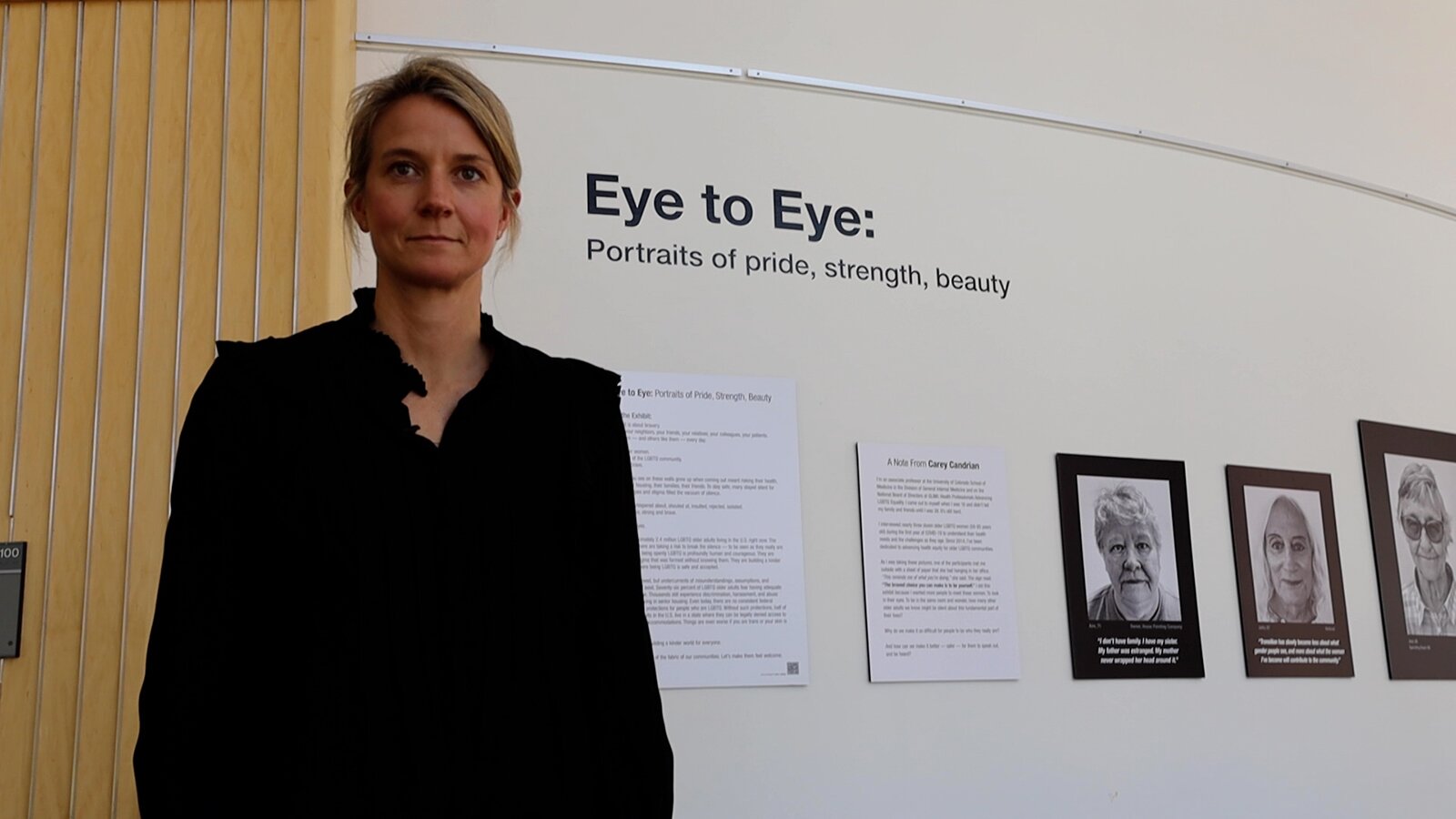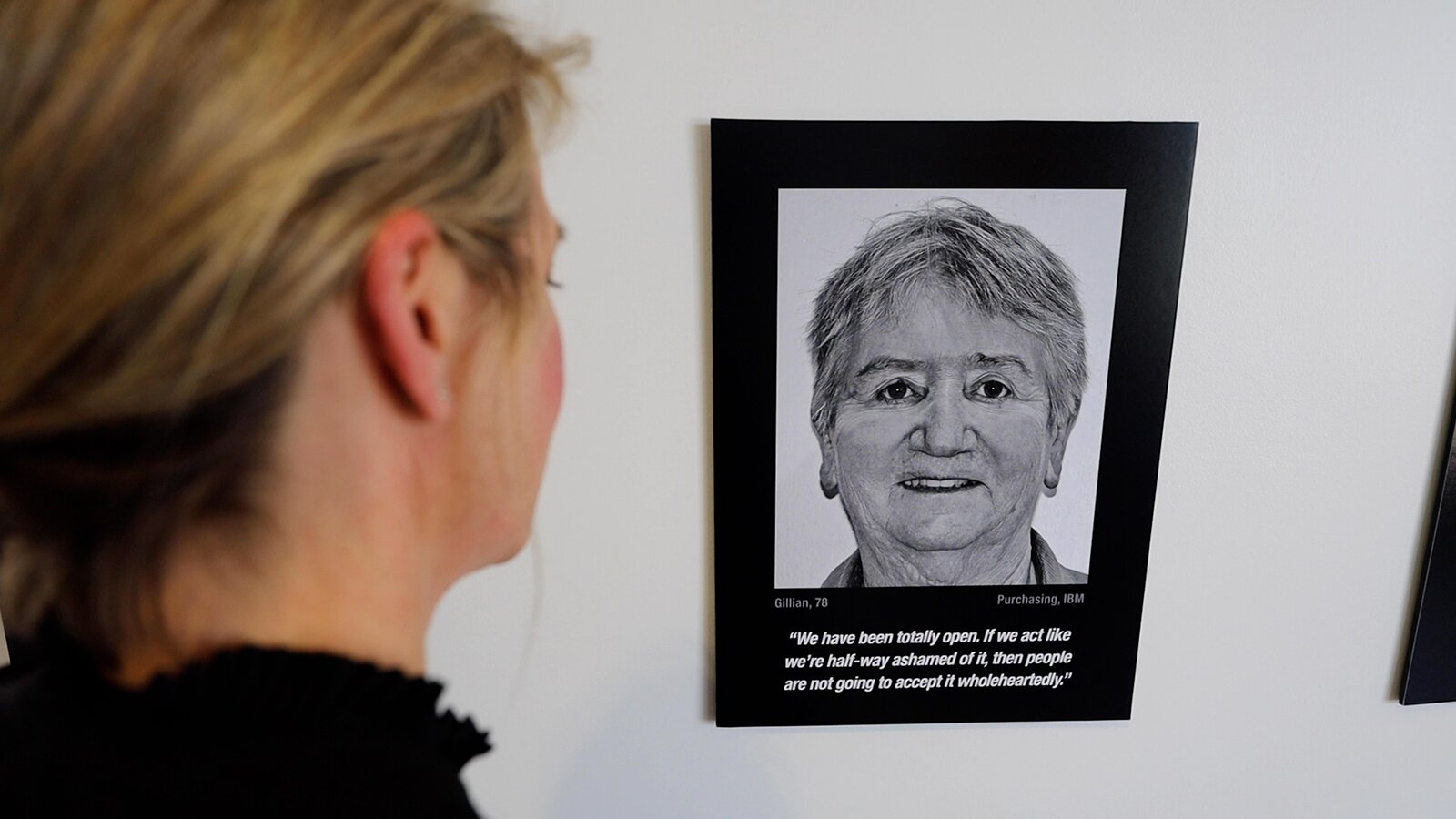'Eye to Eye' photography exhibit centers the voices of older LGBTQ+ women

AURORA, Colo. — For many, coming out is arguably one of the scariest moments in a person’s life. And for some, the difficulties worsen with age — 66% of older LGBTQ+ adults fear experiencing insufficient support, and 75% of the 2.4 million LGBTQ+ adults 65 years or older in the United States will go back into the closet when they enter assisted living or senior living communities.
Carey Candrian, an associate professor of Internal Medicine at the University of Colorado School of Medicine, wants to humanize these statistics and bring faces to the issue. Her exhibition, “Eye to Eye: Portraits of Pride, Strength, Beauty” at the Anschutz Medical Campus, aims to destigmatize the LGBTQ community through photographs.
“The goal of this project is to actually see these women, see their faces and realize they're not that scary and in hopes of really helping people; just connect human to human, person to person,” Candrian told Rocky Mountain PBS.
In 2020, Candrian, who is part of the LGBTQ+ community, began interviewing and photographing LGBTQ women ages 59-85 to better understand their health disparities in palliative care, hospice, OB/GYN care and assisted living. This project is part of her ongoing professional research, which is published in places like The Journal of Women and Aging, The Gerontologist and The Journal of Palliative Medicine.
“Personally, this is a community that I am part of and I have experienced some of those effects … I want to do something about it,” she explained. “And I think from a professional reason, this is also my career.”

The result of her project is a series of portrait photographs, all taken by Candrian, accompanied by quotes from almost three dozen women sharing their fears, experiences and reflections.
Underneath a photograph of Jude, an 80-year-old geologist, said, “I denied myself for 40 years. Next 40 I became who I am. Now I have a life to live.”
Another reads: “We have been totally open. If we act like we’re half-way ashamed of it, then people are not going to accept it wholeheartedly," Gillian, 78.
“They haven't wanted to remain silent but these photos, I think, are a way of giving them voice and even louder voice,” explained Candrian. “I think the voices that these pictures give them is that 'we have a life worth living.' According to her, these women took a risk to break their silence and show up as their true selves.
“The photos have helped me take it to another level to really be able to make sense of this,” said Candrian. “And I think that's been the biggest thing is that research is so important, the science is so important in it, but we lose the individual behind it.”
Candrian believes that while conditions have improved overall, hurtful stigmas and assumptions about the LGBTQ community hinders older LGBTQ people from getting proper care and humanity as they age — a practice that is not only unfair, but extremely damaging. And often, it’s easy to forget the person behind the statistics.

“We know that there are actually concrete health effects on older LGBT communities like heart disease, certain cancers, anxiety, even suicide,” Candrian explained. “So we know these things exist and they're not getting much better … We have good research to show that these disparities exist. But we aren't doing a lot to actually do something about it.”
And Candrian hopes her photographs will leave a positive, lasting impact on the people who see them, and change the conversations about the aging LGBTQ community.
“These are very good people who want the same things as you want, as other people want. They want to love. They want to be loved,” Candrian said. “ And why I think we continue to make it so difficult for people to be able to be who they are is not right. And I think my hope is that when they see these pictures, they realize it's their friends, it's their family members, it's their colleagues, it's their neighbors.”
“Eye to Eye” is open Monday through Friday, 9:00 a.m. to 5:00 p.m.
Victoria Carodine is the Digital Content Producer for Rocky Mountain PBS. You can reach her at victoriacarodine@rmpbs.org.
Brian Willie is the Content Production Manager with Rocky Mountain PBS. You can reach him at brianwillie@rmpbs.org.